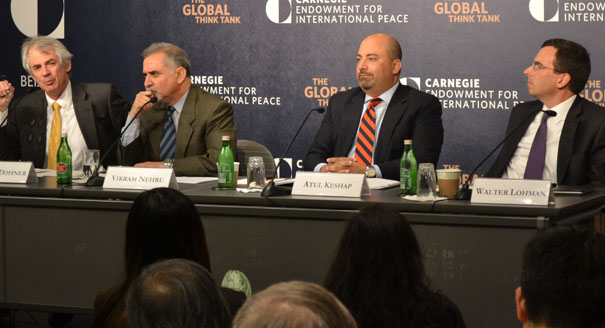{
"authors": [
"Robert Dohner",
"Atul Keshap",
"Walter Lohman",
"Vikram Nehru"
],
"type": "event",
"centerAffiliationAll": "",
"centers": [
"Carnegie Endowment for International Peace"
],
"collections": [],
"englishNewsletterAll": "",
"nonEnglishNewsletterAll": "",
"primaryCenter": "Carnegie Endowment for International Peace",
"programAffiliation": "",
"programs": [
"Asia"
],
"projects": [],
"regions": [
"North America",
"United States",
"East Asia",
"China",
"Taiwan",
"Southeast Asia"
],
"topics": [
"Economy",
"Trade",
"Foreign Policy"
]
}
Economic Dimensions of U.S. Engagement with Southeast Asia
Thu, May 23rd, 2013
Washington, DC
President Obama’s rebalancing strategy seeks to deepen America’s security, economic, and diplomatic engagement with Southeast Asia. But the strategy’s economic dimension has not received the attention and scrutiny it deserves. At a time of fiscal stress at home and economic challenges abroad, the credibility and sustainability of America’s economic engagement with Southeast Asia will be central to its success.
Robert Dohner, deputy assistant secretary for Asia at the U.S. Department of the Treasury, Atul Keshap, senior official for APEC at the U.S. Department of State, and Walter Lohman, director of the Heritage Foundation’s Asian Studies Center discussed the strategic issues underpinning the economic dimensions of U.S. engagement with Southeast Asia. Carnegie’s Vikram Nehru moderated.
Overall Picture
- Critical Dimension: All panelists agreed that the economic dimension plays a significant role in the U.S. rebalancing to Asia. Dohner maintained that U.S. economic engagement with Asia will help the U.S. economy recover faster from the global economic crisis by creating higher income and employment growth.
- Southeast Asia: Keshap added that engagement with Southeast Asia is especially critical, since the region represents a large market with rapid economic growth. It is also one of America’s largest trade partners.
- Private Sector: Lohman stressed that the private sector has played and will continue to play a central role in the economic dimension of America’s engagement with Southeast Asia.
Trans-Pacific Partnership (TPP)
- A Path For Transparent Trade: Both Dohner and Keshap asserted that TPP is the pathway toward open, fair, and transparent trade that meets 21st-century standards. It could potentially form the basis for a free trade agreement that covers all Asia-Pacific Economic Cooperation (APEC) members.
- A Larger Vision: Furthermore, TPP is considered part of the larger U.S. vision of a global high-standard trade network and underlines the U.S. support for global trade liberalization, they added.
- Game Changer: In addition, Lohman argued that TPP is a game changer since it has brought about an unprecedented degree of involvement by governments. The Obama administration has made TPP the centerpiece of its engagement with Asia.
Other Economic Initiatives
- U.S. Expansion: Keshap maintained that the U.S. government has shown consistent effort in expanding its diplomatic and economic presence in ASEAN. Washington has invested heavily in both building and participating in regional institutions.
- Regional Role: The United States is playing an increasingly important role in APEC, East Asian Summit, and the U.S.-ASEAN Summit, he added. It has also contributed to building ASEAN’s institutional structure, through initiatives such as the ASEAN Single Window and the U.S.-ASEAN Expanded Economic Engagement (E3), as well as the Lower Mekong Initiative. Among these initiatives, Lohman suggested that the E3 could be used strategically to prepare the remaining ASEAN countries for eventually joining the TPP.
Carnegie does not take institutional positions on public policy issues; the views represented herein are those of the author(s) and do not necessarily reflect the views of Carnegie, its staff, or its trustees.
Event Speakers
Robert Dohner
Atul Keshap
Walter Lohman
Nehru was a nonresident senior fellow in the Carnegie Asia Program. An expert on development economics, growth, poverty reduction, debt sustainability, governance, and the performance and prospects of East Asia, his research focuses on the economic, political, and strategic issues confronting Asia, particularly Southeast Asia.
